Long-Run Expectations And Capacity
Long-Run Expectations And Capacity
Abstract
In this paper, we argue at a general level, that recent economic models of capacity and of its utilization are deficient because they do not adequately take into account firms' long-run expectations about conditions which are pertinent to their investment decisions, i.e., their decisions about altering productive capacity. We argue that the problem with these models is that they rely on the two conventional definitions of capacity which ignore these long-run expectations. Accordingly, we propose a third definition of capacity which incorporates these expectations and, thereby, corrects the problem. Furthermore, we argue that a correct, empirical analysis with the proposed definition -- indeed, any credible analysis of capacity or its utilization -- must take into account the demand for the output produced by the firms being studied. Finally, we apply the definition to clarify the meaning of surveys of capacity and, thus, show how it can be used to improve future surveys of capacity.
Others in Series
Working Paper
Working Paper
Working Paper




